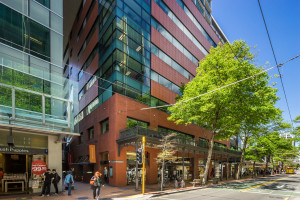Investor confidence in New Zealand’s commercial and residential property markets remains positive, the latest Colliers International survey results show
But the research also reveals a tale of two post-quake cities, with investors remaining optimistic about the Wellington market and more negative about Christchurch.
The quarterly surveys, which track sentiment in the commercial and residential property markets, were conducted by the Colliers International Research and Consultancy team this month.
The results show overall net confidence in the New Zealand commercial property market remains positive at 24 per cent, down from 32 per cent in Q4 2016, while confidence in the residential market remains steady at 41 per cent.
In Wellington, confidence in the commercial property market has grown despite November’s magnitude 7.8 earthquake, which reduced available office space by 7 per cent. Overall confidence is at 29 per cent, up from 22 per cent in Q4 2016.
Optimism in the capital’s office sector has reached a record high, with confidence at 39 per cent – the most positive result since the survey began in 2006.
Confidence also remains high in the Wellington residential market, at 51 per cent, up from 28 per cent in December 2016. However, this is still lower than the pre-quake high of 63 per cent in September 2016.
It’s the opposite story in Christchurch, where investor confidence in the commercial market has dipped to its lowest point since Q1 2011, which coincided with the February 2011 earthquake. Confidence is at -2 per cent, down from 15 per cent in the last quarter.
The Christchurch residential market has also dipped, with confidence down 14 points to 0 per cent – meaning respondents are evenly split on whether the median price will go up or down in the next 12 months.
Colliers International Research and Consulting National Director Alan McMahon says while there has been a dip in commercial investor confidence, the 24 per cent net positive result means a significant majority of those who think the market will change are optimistic.
“New Zealand market fundamentals are sound, with demand for offices, shops, and industrial property remaining steady to strong across the country,” he says.
“Centres with good growth in resident or visitor numbers, which boosts demand for all property types, tend to have higher confidence.”
The top commercial market for investor confidence is Queenstown, which at 67 per cent has held the top spot for the last seven quarters. The top four is rounded out by Tauranga/Mt Maunganui (56 per cent), Auckland (47 per cent) and Hamilton (41 per cent) for the third quarter in a row.
The top residential market is also Queenstown, where investor confidence is at 74 per cent. The hot spot is followed by Hamilton (59 per cent), Tauranga/Mt Maunganui (56 per cent), and Auckland and Nelson (43 per cent).
McMahon says the overall positivity in the residential sector is a strong result. “It is no surprise that where population growth is strongest, upward price pressure is more evident than in centres with slow-growing or static populations,” he says.
“The exception is Wellington, which is showing huge confidence despite a relatively slow-growing population. Our view is that Wellington has been too cheap for too long and is now playing catch up.
“At the other end of the scale, Christchurch confidence is neutral, suggesting equilibrium between demand and supply.”
The surveys were based on 2,299 responses from the commercial sector and 14,781 responses from the residential sector.



